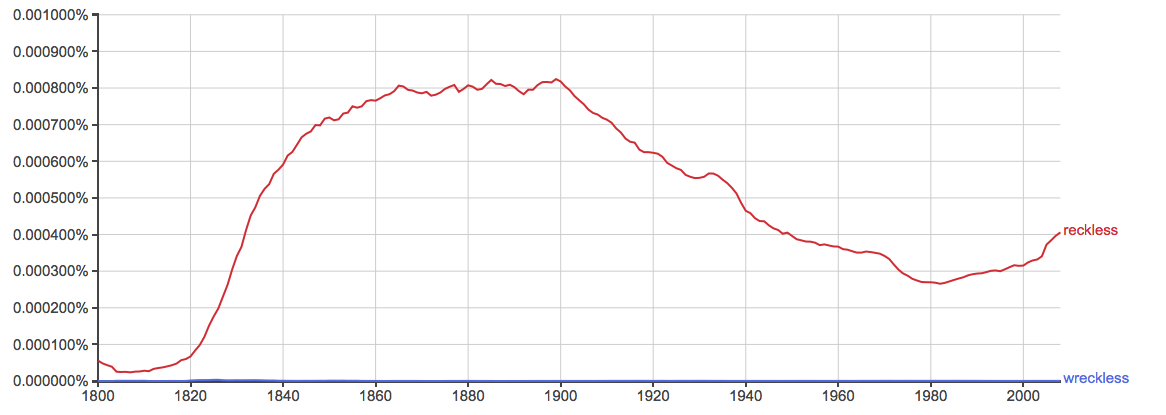English is full of words that have more than one correct spelling. The evolution from deviant error to accepted convention is long and sometimes nonlinear. There are still many words that are in the midst of this evolution, as well as some that have not yet started it.
Wreckless falls into the latter category. It is sometimes used in place of the adjective reckless. Consider the implied meaning of wreckless carefully before you type in onto your page.
Is that really what you intend to say, or would reckless be a better choice?
Read on to discover the difference between these two spellings, and to learn whether you should choose wreckless or reckless in your writing.
What is the Difference Between Wreckless and Reckless?
In this article, I will compare wreckless vs. reckless. I will outline the definition of the word and explain its proper context. Then, at the end, I will show you a helpful trick to use if you can’t decide to use reckless or wreckless.
When to Use Reckless
 What does reckless mean? Reckless is an adjective that means dangerously careless. It can be made an adverb by adding -ly to the end, forming recklessly. Of course, adjectives are used to modify nouns, where adverbs are used to modify verbs.
What does reckless mean? Reckless is an adjective that means dangerously careless. It can be made an adverb by adding -ly to the end, forming recklessly. Of course, adjectives are used to modify nouns, where adverbs are used to modify verbs.
You can see the proper use of reckless in the following examples,
- Kevin was cited for reckless endangerment.
- Wilhelmina chose a reckless, party going lifestyle, and did not concern herself with the consequences of her choices.
- Driving while under the influence of alcohol is reckless, and should be avoided.
- A reckless moment of bike handling in the first half of the final race caused a crash that wiped out three riders, including Viviani. –The Wall Street Journal
When to Use Wreckless
What does wreckless mean? Wreckless is a common misspelling of the word reckless. There are no contexts in which its usage is correct. Whenever it is used as a substitute for reckless, it is considered a spelling error—in both American and British English.

The above chart graphs reckless vs. wreckless over the past 200 years, and, as you can see, wreckless barely even registers.
In fact, Garner’s Modern American English lists the ratio of reckless to wreckless at 1,072:1. For every 1,072 times that reckless is used, wreckless is used only one single time.
To say that reckless is the preferred spelling is a pretty big understatement. It’s the only acceptable spelling.
And in many situations, this misspelling is very ironic. In the context of driving, for example, wreckless driving would characterize driving that doesn’t result in any car accidents. Reckless driving, on the other hand, would be unsafe driving, and would probably lead to many accidents.
Despite being invariably wrong, wreckless still finds its way into published writing from time to time. You should pity the guilty authors, as they clearly do not have the support of an adequately resourced editing team.
Luckily, since you’re reading this article, you never need to make the same mistake.
Trick to Remember the Difference
 It’s fairly easy to remember to avoid wreckless. Think about what the word actually means, especially in the sense of driving—wreckless driving would mean driving without wrecks.
It’s fairly easy to remember to avoid wreckless. Think about what the word actually means, especially in the sense of driving—wreckless driving would mean driving without wrecks.
If you’re describing driving that is unsafe, you mean the opposite. Remember to always use reckless by considering what wreckless would mean if it were an actual word.
Summary
Is it reckless or wreckless? To recap, wreckless is not a word. If it were a word, it would actually mean the opposite of reckless, which is an adjective that describes something that is dangerously careless or unconcerned with consequences.
- Reckless is the correct spelling.
- Wreckless is a common misspelling of reckless.
You should always choose reckless over wreckless in your writing. If you’re having trouble remembering, you should keep in mind the implied meaning of wreckless. It’s actually the opposite of what you really mean by using reckless.
If your memory fails you, you could always check this article as a quick refresher.
Contents
